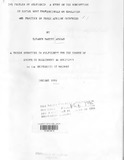| dc.description.abstract | The problem of relevance in the practice of social work in the African context is examined in this thesis. In particular, the focus is on the perceptions of social work practitioners, administrators and educators of the contemporary professional system as it operates in Zambia, Tanzania, and Kenya.
These countries have adopted varying ideologies--humanism, socialism, and capitalism (called African socialism), respectively. But despite this, each one is characterized by conditions of underdevelopment which have implications for what can be done by African professionals with and for the majority of people. Relevance defined by this thesis necessitates responses to these conditions that address the particular human and social problems fundamentally rather than pallatively. I argue, therefore, that for relevance of practice in such contexts, the criteria to be met are that practice strategies or approaches be broad-based, that administrative structures legitimate the authority of the professionals, and that education equips practitioners with a change-orientation. Failure in the attainment of relevance in the professional system results when these factors do not operate to reinforce one another.
Some practice strategies are examined. This is done through the use of vignettes which are derived from practice in the region and about which the views of social work professionals are elicited as to an appropriate response to that particular type of problem in their own setting. The administrative bureaucracy is studied in terms of the administrator/professional relationship. A detailed quantitative analysis considers the extent to which the administrator gives leeway to the practitioner to exercise professional expertise through the sharing of power for the achievement of professional as well as organizational goals. The arrangement of educational programmes is examined so as to ascertain what the emphases in educational content portend for increasing the capacities of professionals to initiate and to sustain change activity in practice. Both quantitative and qualitative methods are employed to investigate what is done in educating African professionals. Comparisons are made of the responses of individual social work professionals between the three groups and across the three country settings.
This procedure sets out the important similarities as well as the difference8 existing, despite the differing socio-political situations. The conclusions derived from the study are that the factors of both the administrative structures and education severely limit practice to less relevant strategies. Education reflects local conditions in its design and content emphases. Yet, the organization of practice administrations and educational programmes permit much less activity affecting these conditions than is required for relevance of practice as defined by this thesis. | en |

